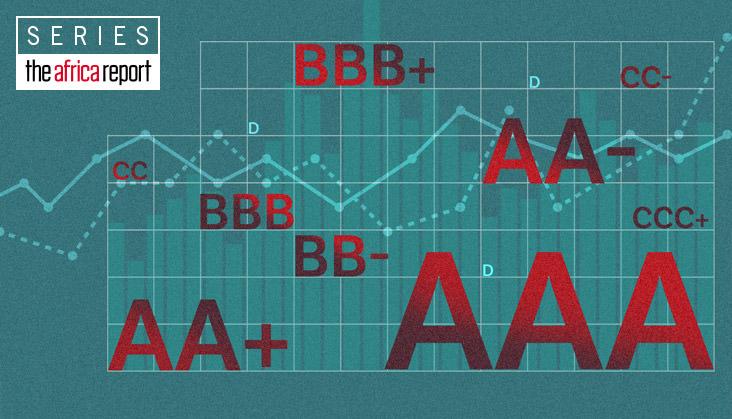Africa-Press – Lesotho. The global leaders in financial ratings for debt are once again facing a salvo of criticism from some 60 development actors. Here are some explanations and responses from the institutions in question.
“A detailed analysis showed that 61 of 154 rated sovereigns were downgraded by at least one of the three major rating agencies during the Covid-19 pandemic.
Developing countries were [affected] by almost all sovereign downgrades, negative outlooks and rating revisions,” says the Financing for Sustainable Development Report 2022, which was published on 12 April.
The report, which devotes a long – and largely unnoticed – section to the detrimental impact of the rating agencies’ decisions, was produced by the UN’s Inter-Agency Task Force on Financing for Development and some 60 multilateral institutions, including the IMF, the World Bank, the Basel Committee on Banking Supervision, the International Association of Insurance Supervisors and the Financial Stability Board.
Partial severity The study draws a parallel between the severity of the world’s leading financial rating agencies – Moody’s, Standard & Poor’s and Fitch Ratings – towards the countries of the South, and their relative leniency towards rich nations.
“Developed countries, which have experienced a much larger increase in debt and economic slowdown, have largely escaped downgrades, reinforcing their access to abundant and affordable market financing,” the report’s authors say, stressing “the importance of transparent methodologies to avoid undermining confidence in ratings”.
UN’s Financing for Sustainable Development Report 2022 “All Fitch’s sovereign rating decisions are made solely on the basis of globally consistent and publicly available rating criteria,” a spokesperson for the New York-based agency tells us.
Fitch’s representative also insists on the transparency of its decision-making. “The rating factors and sensitivities are clearly identified in our public comments. The rating decisions are based on independent, solid, transparent and rapid analysis,” he says.
On the rating gap between developed countries and those in the developing or emerging world, our interlocutor recalls that the former have, among other things, “high incomes, strong governance standards, diversified economies, deep local capital markets”, as well as “foreign exchange reserves and debt largely denominated in their own currency”.
Hence their “high debt tolerance and lower borrowing costs compared to economies without these credit fundamentals”. Standard & Poor’s said it could not immediately respond to our request for comment.
Moody’s, which recently took over the pan-African rating agency Global Credit Ratings (GCR), did not respond. Debt service suspension The latest edition of the Financing for Sustainable Development report also raises the issue of the rating agencies’ attitude towards the Debt Service Suspension Initiative (DSSI).
In mid-2020, the UN vehemently contested the “placing under surveillance” of the ratings of several African countries, including Senegal and Cameroon, prior to their participation in the programme with public lenders.
Moody’s had said that participating in the DSSI “increases the risk that private sector creditors will suffer losses”. “Fitch has not downgraded any country for participation in DSSI, and we have regularly explained our approach in our publications and in discussions in a number of forums,” the agency spokesperson tells us.
However, the study itself notes that “some developing countries, particularly those with high risk of debt distress, have been deterred from joining the programme for fear that their participation would trigger downgrades”.
“More dialogue could have helped avoid such misunderstandings, both on the part of countries and rating agencies. A permanent and formal structure or framework to facilitate further dialogue could be envisaged,” says the report.
For its authors, “public sector debt relief can help strengthen countries’ balance sheets and their ability to repay all their debt in the medium term”.
Has the climate factor been taken into account? The April report makes a new set of arguments against international agencies regarding their inadequate consideration of climate change.
The study’s authors acknowledge that these financial analysis institutions “already incorporate climate risk into their ratings”, but they argue that “a country’s efforts to invest in the development goals, including climate resilience and adaptation” should be taken into account “favourably in ratings”, in the same way as “capital expenditure”.
We expect climate change to trigger more rating changes as the effects become clearer, closer and more significant “Ideally, rating methodologies should incorporate longer-term factors, such as environmental and social risks and improvements,” the authors say, which would “capture the positive effects of investments in climate and environmental resilience”.
Fitch Ratings insists that it takes climate change into account in its sovereign ratings, “as it does for all factors it considers relevant and important to creditworthiness”.
However, it acknowledges that ratings “generally give more weight to current developments than to uncertain long-term projections”. According to its representative, however, Fitch expects “climate change to trigger more rating changes as the effects become clearer, closer and more significant”.
For More News And Analysis About Lesotho Follow Africa-Press






